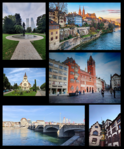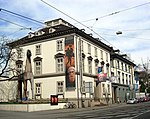Elisabethenkirche, Basel
Churches completed in 1864European church stubsGothic Revival church buildings in SwitzerlandReformed churches in BaselSwiss building and structure stubs ... and 1 more
Tourist attractions in Basel

The Elisabethenkirche, or Offene Kirche Elisabethen, is a 19th-century church building in the centre of Basel, next to the Theater Basel, in Switzerland. It is a well detailed example of Swiss Gothic Revival style churches. It has a 72 metres (236 ft) tall bell tower and spire. The tower has internal stairs.
Excerpt from the Wikipedia article Elisabethenkirche, Basel (License: CC BY-SA 3.0, Authors, Images).Elisabethenkirche, Basel
Elisabethenstrasse, Basel Vorstädte
Geographical coordinates (GPS) Address Website External links Nearby Places Show on map
Geographical coordinates (GPS)
| Latitude | Longitude |
|---|---|
| N 47.552777777778 ° | E 7.5911111111111 ° |
Address
Elisabethenkirche
Elisabethenstrasse
4010 Basel, Vorstädte
Basel-City, Switzerland
Open on Google Maps









